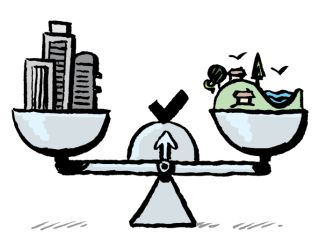Regional Ireland needs adequate investment to thrive

Over 3 million people live in rural Ireland as defined to be outside the administrative boundaries of the 5 main cities of Dublin, Waterford, Galway, Cork and Limerick. This is over 60 per cent of the population of Ireland, and yet the bulk of investment continues to be concentrated within urban centres. To this end, Social Justice Ireland welcomed the Ireland 2040 planning framework and the focus on ensuring there is balanced rural and regional development. For this to be achieved it will be essential that adequate resources are deployed immediately for the implementation of policy, and that a full Inter-Departmental commitment to rural Ireland is secured.
Rural and regional economies
In conjunction with lower participation rates in and between regions, there is also a need to consider the sustainability of some of the employment across Ireland. In some regions many of the jobs currently available will be transformed or indeed made redundant in the medium term either by disruptive technology or by the need to adapt to a low carbon economy. Social Justice Ireland proposes the establishment of a regional development and transition programme. This programme would have the task of aligning Rural Development Policy, the Regional action Plans for Jobs, Future Jobs Ireland and the All of Government Climate Plan with the principles of just transition and helping communities across the country develop sustainable local economies and livelihoods for the people who live there. Investment in Smart Villages with a focus on revitalising rural services, investment in education for the current and future generation of farmers to move to more sustainable agricultural methods, and the development of local cooperatives should also form part of the Regional Development and Transition policy. €50m should be allocated to Regional Development and Transition in Budget 2020.
In addition to the investment in regional development and transition we are proposing an additional €25m to Enterprise Ireland to develop and support indigenous enterprises and job creation across the regions, particularly those areas who will be most impacted by Brexit. We also propose an additional €25m for Fáilte Ireland to promote local and regional tourism initiatives.
Rural transport
Increased funding is required for rural public transport, yet the €8.6 billion committed to public transport in the National Development Plan focuses primarily on Metro North, DART expansion and BusConnects in Dublin, Galway and Cork. Social Justice Ireland calls on Government to invest an additional €50m to the Rural Transport Programme, increasing the range of public transport options and ensuring the rural public transport options and fleet are in line with our climate commitments, safe-guarding communities from isolation, and incentivising greater public transport usage.
Broadband
The European Commission has updated its targets under the Digital Agenda for Europe. Common EU broadband targets for 2025 now set a target for households of subscriptions to 100mbps by 2020 (formerly set at 50% of households). According to Census 2016, only 61 per cent of rural households had broadband access as opposed to 76 per cent in urban areas. The employment commitments in Government’s Action Plan for Rural Development—Realising our Rural Potential are heavily reliant on the provision of reliable, quality, high-speed broadband. The National Broadband Plan continues to face issues and has yet to be properly implemented.
Social Justice Ireland proposes that €300m be made available for Digital Agenda for Europe targets.
Community and Voluntary Sector
Funding for the Community and Voluntary sector was greatly reduced during the recession. While resources have been restored to the majority of other sectors, the scale of resources available to the Community and Voluntary sector today falls far short of what was available prior to the crash, while demand for its services and supports, not to mention the increased administrative and regulatory duties imposed upon it, have increased. Social Justice Ireland proposes an increase of €30m to the Community and Voluntary Sector to enable it to provide key services and supports in our communities.
Public Participation Networks (PPNs)
PPNs have a significant role in the development and education of their member groups, sharing information, promoting best practice, and facilitating networking. Building real engagement at local level is a developmental process that requires intensive work and investment. Social Justice Ireland proposes that an additional €3m be provided to enable PPNs to fully engage with their membership in democratic processes.
Local Community Development Committees
LCDCs provide a platform for engagement between civil society and local government with a wide-ranging mandate on strategic policy issues. In support of this, Social Justice Ireland proposes an increase of €1m to support meaningful engagement in LCDCs.
Social Enterprises and Deficit Demand
There is a diverse range of organisations within the social enterprise arena, ranging from those responding to ‘deficit demand’, particularly in under-represented and disadvantaged areas, to social entrepreneurs whose business model is most closely aligned to the commercial sector. While not differentiated within the draft National Social Enterprise Policy for Ireland 2019-2022, it is imperative that those social enterprises dealing with deficit demand are supported due to their impact on their communities. Social Justice Ireland proposes that €5m be provided to social enterprises catering to deficit demand.
Legal Supports and Access to Justice
Addressing imbalances in accessing justice in the court system is largely dependent on accessing sound legal advice that takes account of the nuances of the case and puts forward the best legal argument available. The costs associated with accessing legal advice can be prohibitive. There is a waiting list for almost all Legal Aid Board centres, with some as high as 48 weeks for a first appointment. Justice delayed is justice denied. Social Justice Ireland therefore proposes an increase of €5m for civil legal aid.